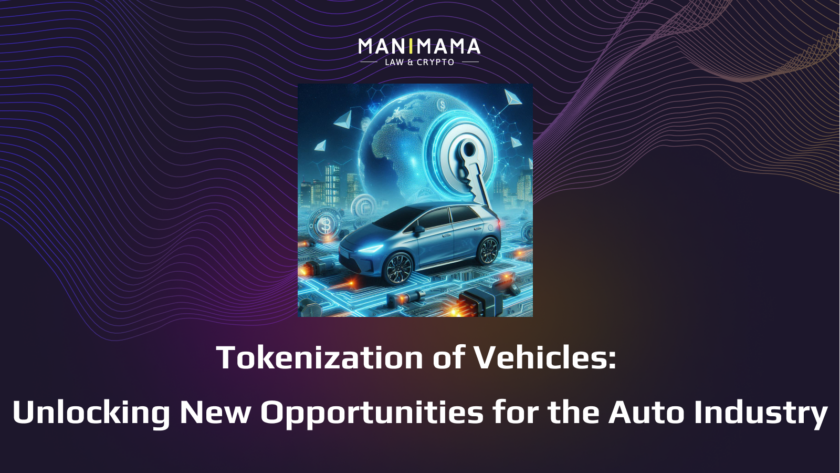Tokenization of Vehicles: Unlocking New Opportunities for the Auto Industry in the Blockchain Era

As the automotive industry embraces digital transformation, tokenization is emerging as a revolutionary concept, poised to redefine how we perceive vehicle ownership, usage, and value. Using blockchain technology, tokenization transforms vehicles and their associated rights into digital tokens, ensuring secure, transparent, and efficient transactions.
This article explores the foundational principles of vehicle tokenization, its benefits for both owners and manufacturers and the challenges it addresses in traditional automotive markets. We’ll also delve into how tokenization works, and its promising prospects in revolutionizing the auto sector.
*Tokenization refers to converting a tangible or intangible asset into a digital token that can be stored, transferred, or traded on a blockchain. In the context of vehicles, tokenization involves representing ownership, usage rights, or other associated values of a vehicle as digital tokens. These tokens are securely recorded on a blockchain, ensuring transparency, immutability, and ease of transfer. This approach enables vehicle-related transactions to occur more efficiently, reducing the reliance on traditional paperwork or intermediaries.
How Vehicle Tokenization Works
Blockchain technology serves as the foundational infrastructure for vehicle tokenization. It creates a decentralized, secure, and transparent ledger that records all transactions involving tokenized vehicles. Unlike traditional systems, where records are managed by centralized authorities, blockchain ensures that every transaction is immutable and verifiable. Each tokenized vehicle transaction—a transfer of ownership, rental agreement, or usage record—is recorded in real time and linked to previous transactions, creating a reliable and auditable history. Smart contracts, which are self-executing agreements stored on the blockchain, further enhance the efficiency of this system by automating processes like ownership updates or payment verifications without manual intervention.
The Significance of Tokenization for the Automotive Industry
The automotive industry stands to benefit significantly from tokenization. By leveraging blockchain technology, tokenization simplifies the ownership transfer process, enhances transparency in vehicle history, and reduces administrative overhead. It opens up new possibilities, such as fractional ownership, where multiple investors can co-own a vehicle or fleet. This innovation also facilitates seamless integration with emerging trends like car-sharing platforms and decentralized financing (DeFi), making vehicles more accessible and adaptable to the needs of modern consumers. As a result, tokenization modernizes the automotive sector and paves the way for innovative business models and revenue streams.
Benefits of Tokenization of Vehicles
Around-the-clock trading
Imagine a world where you can trade shares in vehicles just as easily as stocks, at any time of day, without the need for traditional brokerages. Tokenization makes this possible, creating a vibrant, 24/7 market that offers liquidity and flexibility.
Simplified transactions
Tokenization can streamline the buying and selling process by automating and securing transactions with smart contracts. This can reduce the need for middlemen, lowering transaction costs and making processes more efficient.
Increased capital influx
As vehicles become fractionalized and more accessible, a greater number of investors can participate, leading to a larger capital influx into the market.
Accessible partial ownership
Tokenization breaks down financial barriers, allowing for the fractional ownership of traditionally expensive assets like classic vehicles. This means that investors can acquire fractions of expensive vintage cars, making it easier for more people to invest in these assets.
Ease of liquidation
Tokenized assets can be liquidated at any desired time without the usual hurdles such as legal fees, paperwork, and costly working hours, making the process more efficient.
Tax advantages
In certain jurisdictions, like Liechtenstein, the tokenization of assets offers compelling tax advantages, making it not only a smart investment in terms of asset appreciation but also a savvy tax strategy.
Challenges in Traditional Automotive Markets
- Initial and ongoing costs:
- Purchase price: traditional ownership entails a substantial upfront investment, including the purchase price of the vehicle, which can be a significant financial burden for many consumers.
- Ongoing expenses: beyond the initial purchase, owners face ongoing costs such as maintenance, insurance, fuel, and registration fees, which can add up over the vehicle’s lifetime.
Maintenance and management:
- Responsibility for maintenance: owners are responsible for all aspects of vehicle maintenance, including routine servicing, repairs, and upkeep. This can be both costly and time-consuming, especially for older vehicles or those with complex mechanical systems.
- Time and effort: managing maintenance schedules, arranging repairs, and dealing with unexpected breakdowns can consume valuable time and effort for vehicle owners, impacting their daily lives and productivity.
Accessibility and inclusion:
- Financial barrier: traditional car ownership can be exclusionary for individuals or families with limited financial means, as it requires significant upfront costs and ongoing expenses.
- Geographical limitations: in areas with limited public transportation infrastructure, the lack of affordable and accessible transportation options can further exacerbate disparities in mobility and economic opportunity.
Market liquidity and flexibility:
- Selling challenges: selling a vehicle can be a complex and time-consuming process, involving advertising, negotiating, and transferring ownership paperwork. Additionally, market value uncertainties and fluctuations can impact the resale value of the vehicle, leading to potential financial losses for sellers.
- Low asset liquidity: vehicles are generally considered illiquid assets, meaning they cannot be easily converted into cash without incurring significant transaction costs or delays. This lack of liquidity can limit individuals’ flexibility in managing their assets and financial resources.
Technological adaptation and data privacy:
- Rapid technological advancements: owners may face challenges in keeping up with rapidly evolving automotive technologies like advanced driver-assistance systems (ADAS). Adapting to these technologies may require additional training, expertise, and financial investment.
- Data privacy concerns: modern vehicles collect and transmit vast amounts of data, including location information, vehicle diagnostics. Owners may have concerns about the privacy and security of their personal data, especially in light of potential data breaches or unauthorized access by third parties.
Future Prospects of Vehicle Tokenization
Tokenization has the potential to reshape the automotive industry by enabling a more decentralized, efficient, and transparent ecosystem. By digitizing vehicle ownership and related services, tokenization can eliminate traditional barriers, such as complicated ownership transfers and costly intermediaries. The introduction of fractional ownership allows individuals or businesses to co-own high-value vehicles, making luxury cars or commercial fleets accessible to a broader audience. Additionally, tokenization could redefine vehicle financing, leasing, and insurance models, allowing transactions to be streamlined and personalized in real time. For manufacturers, tokenization enables the creation of new revenue streams by integrating smart contracts for pay-per-use models or maintenance services.
As Conclusion
Tokenization brings transformative benefits to the automotive industry, from simplifying ownership and reducing administrative costs to unlocking innovative business models like fractional ownership and decentralized financing. It provides greater transparency in vehicle history, improves accessibility to vehicles through shared ownership models, and integrates seamlessly with modern technologies such as AI and IoT. These advancements position tokenization as a cornerstone of a more efficient, secure, and user-friendly automotive ecosystem.
Manimama Legal & Growth Agency іs a trusted expert in vehicle tokenization, combining deep legal expertise with innovative blockchain solutions. Whether you’re looking to streamline ownership transfers, explore fractional ownership, or integrate your automotive assets into the digital economy, our team is here to guide you every step of the way.
Our Contacts
If you want to become our client or partner, feel free to contact us at [email protected].
Or use our telegram: write to our bot (@ManimamaBot) or our channel (@manimama_sales) and we will respond to your inquiry.
We also invite you to visit our website: https://manimama.eu/.
Join our Telegram to receive news in a convenient way: Manimama Legal Channel.
Spotted something? Got a story? Send a Facebook Message | A direct message on Twitter | Email: [email protected] Latest News








